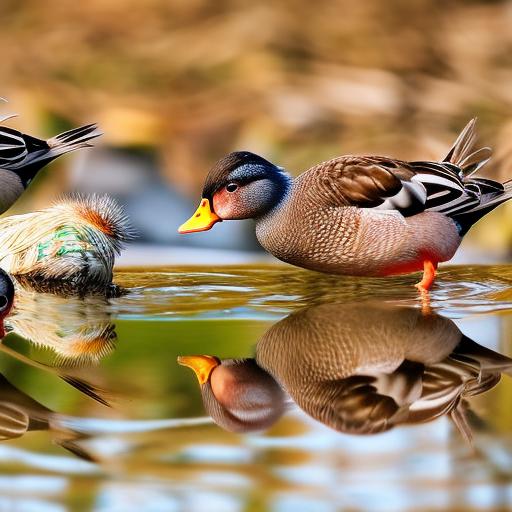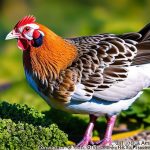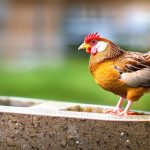Keeping ducks and chickens together can be a rewarding experience for poultry enthusiasts. There are several benefits to housing these two species together, such as increased pest control and entertainment value. However, there are also drawbacks to consider, such as the potential for disease transmission and aggression between the two species. In this post, we will provide more information on how to successfully keep ducks and chickens together, including tips on designing a coop, managing their health and hygiene, and dealing with aggression issues.
Key Takeaways
- Keeping ducks and chickens together has both pros and cons.
- Ducks and chickens have different needs and behaviors that must be understood before keeping them together.
- Factors such as space, food, and water availability must be considered before keeping ducks and chickens together.
- A well-designed coop can accommodate both ducks and chickens.
- Proper management of health, hygiene, aggression, and dominance issues is crucial when keeping ducks and chickens together.
Understanding the Differences Between Ducks and Chickens
Before attempting to keep ducks and chickens together, it is important to understand the physical and behavioral differences between these two species. Ducks have webbed feet and are excellent swimmers, while chickens have claws and are better suited for perching. Ducks also have a different diet than chickens, as they require more water in their diet due to their aquatic nature. Additionally, ducks tend to be more messy than chickens, as they produce more waste and require access to water for bathing.
Factors to Consider Before Keeping Ducks and Chickens Together
There are several factors to consider before keeping ducks and chickens together. First, you must ensure that you have enough space to accommodate both species. Ducks require more space than chickens due to their larger size and need for water access. It is also important to provide appropriate food and water for both species. Ducks require a water source deep enough for them to submerge their heads in order to clean their nostrils, while chickens require a constant supply of fresh water.
Another important consideration is the need for a secure coop and run to protect the ducks and chickens from predators. Ducks are more vulnerable to predators than chickens due to their inability to fly away quickly. Therefore, it is important to provide a secure enclosure that is predator-proof, with fencing that extends below ground level to prevent digging predators from gaining access.
Designing a Coop for Ducks and Chickens
When designing a coop for ducks and chickens, it is important to provide separate nesting boxes and roosting areas. Ducks prefer to nest on the ground, while chickens prefer elevated nesting boxes. Providing separate areas for each species will help minimize conflict and ensure that each species has their own space to lay eggs and rest.
It is also important to provide adequate ventilation in the coop to prevent the buildup of moisture and ammonia from the ducks’ waste. Ducks produce more waste than chickens, so proper ventilation is essential for maintaining a healthy environment for both species.
Feeding and Watering Ducks and Chickens Together
Feeding ducks and chickens together can be challenging, as they have different dietary needs. Ducks require a higher protein diet than chickens, as they need to support their growth and feather development. It is important to provide a balanced diet that meets the nutritional needs of both species. This can be achieved by offering a commercial poultry feed that is suitable for both ducks and chickens, supplemented with fresh fruits, vegetables, and insects.
When it comes to watering, ducks require access to water deep enough for them to submerge their heads in order to clean their nostrils. This can be achieved by providing a shallow dish or pool of water that is easily accessible to the ducks but not too deep for the chickens.
Managing the Health and Hygiene of Ducks and Chickens in a Shared Coop

Maintaining a clean coop and run is essential for the health and hygiene of both ducks and chickens. Ducks produce more waste than chickens, so it is important to regularly clean out their bedding and replace it with fresh material. This will help prevent the buildup of ammonia and reduce the risk of respiratory issues.
Regularly inspecting the ducks and chickens for signs of illness or injury is also important. Common health issues in both species include respiratory infections, parasites, and foot problems. It is important to provide appropriate veterinary care and treatment when necessary to ensure the health and well-being of both species.
Dealing with Aggression and Dominance Issues Among Ducks and Chickens
Aggression and dominance issues can arise when ducks and chickens are housed together. Chickens have a natural pecking order, and the addition of ducks can disrupt this hierarchy. It is important to monitor the flock closely for signs of aggression and intervene if necessary.
Providing plenty of space, separate feeding areas, and multiple sources of water can help minimize aggression between the two species. It may also be necessary to separate individuals that are particularly aggressive or causing harm to others.
Benefits of Keeping Ducks and Chickens Together
Despite the potential challenges, there are several benefits to keeping ducks and chickens together. One of the main benefits is increased pest control. Ducks are excellent foragers and will eat insects, slugs, and other pests that can be harmful to your garden or crops. Chickens also contribute to pest control by eating insects and scratching the ground to expose pests.
Another benefit is the entertainment value of having both ducks and chickens in your flock. Ducks are known for their playful nature and can provide hours of entertainment with their antics in the water. Chickens also have their own unique personalities and behaviors that can be enjoyable to observe.
Potential Risks and Challenges of Keeping Ducks and Chickens Together
While there are benefits to keeping ducks and chickens together, there are also potential risks and challenges to consider. One of the main risks is disease transmission between the two species. Ducks can carry diseases that are harmless to them but can be harmful or fatal to chickens. It is important to practice good biosecurity measures, such as quarantining new birds before introducing them to the flock, regularly cleaning and disinfecting the coop, and monitoring for signs of illness.
Another challenge is the potential for aggression and dominance issues between ducks and chickens. As mentioned earlier, chickens have a natural pecking order, and the addition of ducks can disrupt this hierarchy. It is important to closely monitor the flock and intervene if necessary to prevent harm to individuals.
Is Keeping Ducks and Chickens Together Right for You?
In conclusion, keeping ducks and chickens together can be a rewarding experience for poultry enthusiasts. However, it is important to carefully consider the pros and cons before deciding to house these two species together. Understanding the differences between ducks and chickens, providing appropriate housing and nutrition, managing their health and hygiene, and addressing aggression issues are all important factors to consider. By taking these factors into account and implementing appropriate management practices, you can successfully keep ducks and chickens together and enjoy the benefits of both species in your flock.
If you’re considering keeping ducks and chickens together in the same coop, it’s important to understand the dynamics and requirements of both species. To help you make an informed decision, Poultry Wizard has a comprehensive article on their website that explores this topic in detail. The article provides valuable insights into the benefits and challenges of cohabitating ducks and chickens, as well as practical tips for creating a suitable living environment for both. To learn more about this fascinating subject, check out their article on can you keep ducks and chickens in the same coop. Additionally, Poultry Wizard offers a wealth of information on poultry care and breeding, so be sure to explore their website at poultrywizard.com for more helpful resources.
FAQs
Can you keep ducks and chickens in the same coop?
Yes, it is possible to keep ducks and chickens in the same coop. However, there are some important considerations to keep in mind.
What are the benefits of keeping ducks and chickens together?
Keeping ducks and chickens together can provide several benefits, including increased socialization and reduced boredom for both species. Additionally, ducks can help control pests like slugs and snails in the coop and surrounding area.
What are the challenges of keeping ducks and chickens together?
One of the main challenges of keeping ducks and chickens together is that they have different dietary needs. Ducks require more water than chickens and may make a mess of the waterer, which can lead to wet conditions in the coop. Additionally, ducks may be more prone to disease than chickens, so it is important to monitor their health closely.
What should you consider when designing a coop for ducks and chickens?
When designing a coop for ducks and chickens, it is important to provide separate areas for feeding and watering. Ducks also require a larger water source, such as a kiddie pool or large bucket, to accommodate their needs. Additionally, the coop should be well-ventilated and provide ample space for both species to move around comfortably.
What are some tips for keeping ducks and chickens together?
Some tips for keeping ducks and chickens together include providing separate feeding and watering areas, monitoring the health of both species closely, and providing ample space for both to move around comfortably. Additionally, it is important to keep the coop clean and dry to prevent the spread of disease.
Meet Walter, the feathered-friend fanatic of Florida! Nestled in the sunshine state, Walter struts through life with his feathered companions, clucking his way to happiness. With a coop that’s fancier than a five-star hotel, he’s the Don Juan of the chicken world. When he’s not teaching his hens to do the cha-cha, you’ll find him in a heated debate with his prized rooster, Sir Clucks-a-Lot. Walter’s poultry passion is no yolk; he’s the sunny-side-up guy you never knew you needed in your flock of friends!







